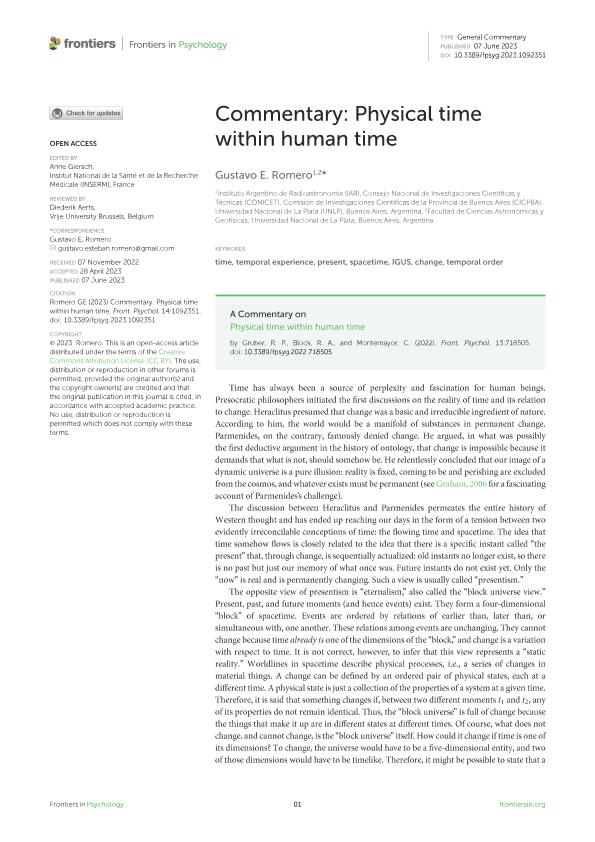Mostrar el registro sencillo del ítem
dc.contributor.author
Romero, Gustavo Esteban

dc.date.available
2023-11-14T13:59:51Z
dc.date.issued
2023-06
dc.identifier.citation
Romero, Gustavo Esteban; Commentary: Physical time within human time; Institut National de la Santé et de la Recherche Médicale (INSERM); Frontiers in Psychology; 14; 6-2023; 1-3
dc.identifier.issn
1664-1078
dc.identifier.uri
http://hdl.handle.net/11336/218026
dc.description.abstract
Time has always been a source of perplexity and fascination for human beings.Presocratic philosophers initiated the first discussions on the reality of time and its relationto change. Heraclitus presumed that change was a basic and irreducible ingredient of nature.According to him, the world would be a manifold of substances in permanent change.Parmenides, on the contrary, famously denied change. He argued, in what was possiblythe first deductive argument in the history of ontology, that change is impossible because itdemands that what is not, should somehow be. He relentlessly concluded that our image of adynamic universe is a pure illusion: reality is fixed, coming to be and perishing are excludedfrom the cosmos, and whatever exists must be permanent (see Graham, 2006 for a fascinatingaccount of Parmenides’s challenge).The discussion between Heraclitus and Parmenides permeates the entire history ofWestern thought and has ended up reaching our days in the form of a tension between twoevidently irreconcilable conceptions of time: the flowing time and spacetime. The idea thattime somehow flows is closely related to the idea that there is a specific instant called “thepresent” that, through change, is sequentially actualized: old instants no longer exist, so thereis no past but just our memory of what once was. Future instants do not exist yet. Only the“now” is real and is permanently changing. Such a view is usually called “presentism.”
dc.format
application/pdf
dc.language.iso
eng
dc.publisher
Institut National de la Santé et de la Recherche Médicale (INSERM)
dc.rights
info:eu-repo/semantics/openAccess
dc.rights.uri
https://creativecommons.org/licenses/by-nc-sa/2.5/ar/
dc.subject
time
dc.subject
temporal experience
dc.subject
present
dc.subject
spacetime
dc.subject.classification
Astronomía

dc.subject.classification
Ciencias Físicas

dc.subject.classification
CIENCIAS NATURALES Y EXACTAS

dc.title
Commentary: Physical time within human time
dc.type
info:eu-repo/semantics/article
dc.type
info:ar-repo/semantics/artículo
dc.type
info:eu-repo/semantics/publishedVersion
dc.date.updated
2023-11-13T15:51:10Z
dc.journal.volume
14
dc.journal.pagination
1-3
dc.journal.pais
Francia

dc.description.fil
Fil: Romero, Gustavo Esteban. Provincia de Buenos Aires. Gobernación. Comisión de Investigaciones Científicas. Instituto Argentino de Radioastronomía. Consejo Nacional de Investigaciones Científicas y Técnicas. Centro Científico Tecnológico Conicet - La Plata. Instituto Argentino de Radioastronomía; Argentina
dc.journal.title
Frontiers in Psychology
dc.relation.alternativeid
info:eu-repo/semantics/altIdentifier/url/https://www.frontiersin.org/articles/10.3389/fpsyg.2023.1092351/full
dc.relation.alternativeid
info:eu-repo/semantics/altIdentifier/doi/http://dx.doi.org/10.3389/fpsyg.2023.1092351
Archivos asociados
